| Victor Westerholm | |
|---|---|
 Westerholm in 1914–1917 Westerholm in 1914–1917 | |
| Born | Victor Axel Westerholm (1860-01-04)4 January 1860 Turku, Grand Duchy of Finland, Russian Empire (now Finland) |
| Died | 19 November 1919(1919-11-19) (aged 59) Turku, Finland |
| Nationality | Finnish |
| Known for | Painting |
Victor Axel Westerholm (4 January 1860 Turku – 19 November 1919 Turku) was a Finnish landscape painter, especially known for founding the Önningeby artists' colony.
Biography
Victor Axel Westerholm was born in Turku in 1860. He was the son of Viktor Westerholm, a ship's master, and Maria Westerholm (née Andersson). As a child he spent a lot of time at the island of Nagu in the Finnish Archipelago. From 1869 to 1878 he studied at the Finnish Art Society's Drawing School in Turku, under Robert Wilhelm Ekman (1808–1873) and Thorsten Waenerberg (1846–1917); and as a young man he studied under Eugen Dücker (1841–1916) in Düsseldorf from 1878-1880. Much later he studied under Jules Joseph Lefebvre(1836–1911) at the Académie Julian in Paris from 1888-1890.
In 1888 he became a teacher at the school of the Society of Art in Turku, and in 1891 became the director of the Turku art museum.
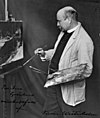
In 1880 he first time visited Åland Islands and subsequently returned there almost every summer. He often painted winter landscapes and sunsets at his summer home, "Tomtebo", bought in 1884 at the village of Önningeby in the Municipality of Jomala on Åland in the Baltic Sea. A studio has also been built there. After completing his studies in Düsseldorf in 1886, he invited Fredrik Ahlstedt, Hanna Rönnberg and Elin Danielson to the newly acquired Tomtebo by the Lemström canal, thus beginning the Önningeby artists' colony (Önningebykolonin). Several artists arrived to Ålands that summer. Visiting artists who spent time in Önningeby include J.A.G. Acke, Hanna Rönnberg, Elin Danielson-Gambogi, Edvard Westman and Elias Muukka. J.A.G. Acke also became his close, life-long friend. Since 1992 Önningeby-museet in Önningeby has exhibited a permanent exhibition of works by the Önningeby artists’ colony.
Westerholm was an instructor at Turku drawing school in 1887–1898 and 1904–1917. In 1891, he was elected as the curator of the newly formed Art Association in Turku.
Personal life



In 1885, he married Hilma Alander, whom he met at a dancing course in Turku. She was not a painter, but Victor encouraged her to take courses at the Turku Drawing School. They had three daughters and two sons. One daughter, Greta Westerholm [fi], was born in Ålands. Westerholm lived in Turku where he died in November 1919 from a flu that turned into pneumonia.
He was calm and thoughtful personality, but also had a good sense of humour. Together with his wife they were rather hospitable hosts on Önningeby. He preferred freedom to paint, but still accepted students and provided instructions at the colony, keeping silence in case he was unsatisfied with a student's work.
Memory
A monument, dedicated to Victor Westerholm, designed by his student Wäinö Aaltonen, was envailed by Lemström Canal near his summer house Tomtebo in 1960.
Works
-
 Werner Holmberg's Graveside, 1882
Werner Holmberg's Graveside, 1882
-
 In the Studio, 1883
In the Studio, 1883
-
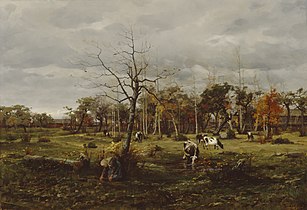 Autumn Landscape, 1883
Autumn Landscape, 1883
-
 An October Day in Åland, 1885
An October Day in Åland, 1885
-
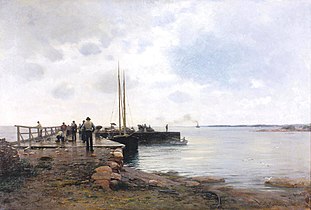 Eckerö Post Quay, 1885 (fi)
Eckerö Post Quay, 1885 (fi)
-
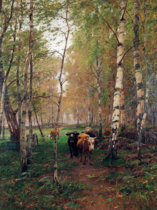 Cows in a Birch Forest, 1886
Cows in a Birch Forest, 1886
-
 Märket lighthouse, 1887
Märket lighthouse, 1887
-
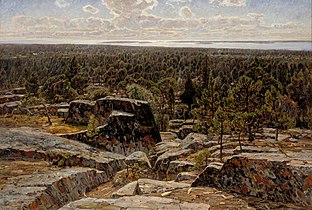 Landscape from Åland, 1895
Landscape from Åland, 1895
-
 Seal Hunting, 1900
Seal Hunting, 1900
-
 Evening Sun, 1901
Evening Sun, 1901
-
 Kymi River, 1902
Kymi River, 1902
-
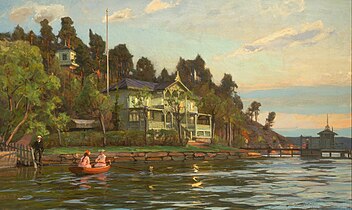 Scene from Hirvensalo, 1903
Scene from Hirvensalo, 1903
-
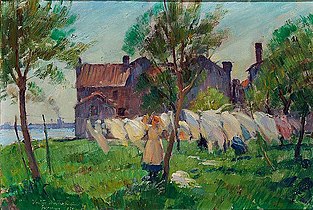 Drying Laundry in the Sun, 1900s
Drying Laundry in the Sun, 1900s
-
 Vallinkoski Rapids, 1917 (fi)
Vallinkoski Rapids, 1917 (fi)
-
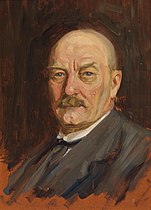 Self-Portrait, 1919
Self-Portrait, 1919
See also
Notes
- The painting won a bronze medal at the Exposition Universelle of 1889.
References
- "Victor Westerholm". Biografiskt lexikon för Finland. Retrieved January 1, 2019.
- ^ The International Studio, v. 33 No. 130 – December, 1907. edited by Charles Holme, Guy Eglinton, Peyton Boswell, William Bernard McCormick, Henry James Whigham. Victor Westerholm, Finnish Landscape Painter. Google Books
- ^ Reitala, Aimo (23 September 2015). "Westerholm, Victor (1860 - 1919)". Kansallisbiografia. Retrieved 9 July 2020.
- "The Önningeby artists' colony". konstmuseum. Retrieved January 1, 2019.
- "visitaland.com – The Önningeby colony". Archived from the original on 2011-07-16. Retrieved 2010-11-04.
- ^ Ekström, Kjell (2023). Ida, Anna and Elin: Three Members of the Önningeby Artists' Colony. Önningebymuseet, UAB BALTO print. ISBN 978-952-69688-5-8.
- Kuvaja, Sini (18 February 2017). "Tunnetko tämän taiteen kultakauden mestarin Noormarkusta? Aikansa kapinallinen eli ja maalasi rohkeasti". Satakunnan Kansa. Retrieved 16 May 2020.
- Valjakka, Timo (30 May 2020). "Hienovaraisesti poliittinen maalaus katsoo länteen Venäjän keisarikunnan läntisimmällä kohdalla Ahvenanmaalla". Helsingin Sanomat. Retrieved 4 August 2020.
External links
![]() Media related to Victor Westerholm at Wikimedia Commons
Media related to Victor Westerholm at Wikimedia Commons